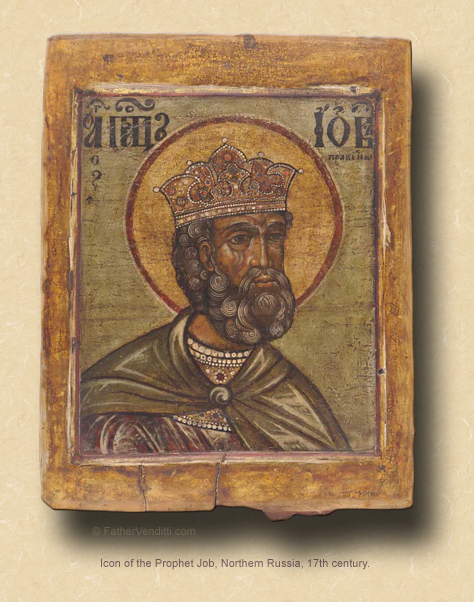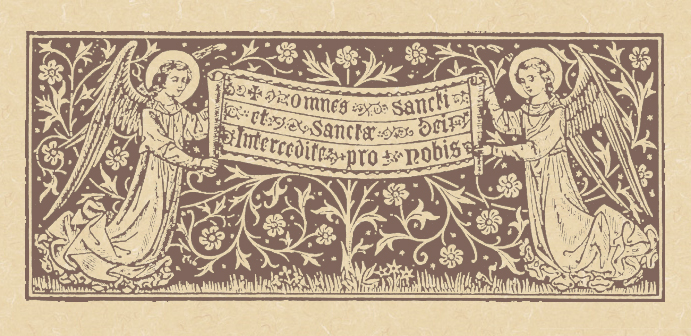Why the Question Will Not Be answered.
The Memorial of Saint Clare, Virgin.
Lessons from the secondary feria, according to the ordinary form of the Roman Rite:
• Habakkuk 1: 12—2: 4.
• Psalm 9: 8-13.
• Matthew 17: 14-20.
|
…or, from the proper:
• Philippians 3: 8-14.
• Psalm 16: 1-2, 5, 7-8, 11.
• Matthew 19: 27-29.
…or, any lessons from the common of Virgins for One Virgin, or the common of Holy Men & Women for a Nun.
|
The Eleventh Saturday after Pentecost; and, the Commemoration of Saint Tiburtius, Martyr, & Saint Susanna, Virgin & Martyr.*
Lessons from the dominica,** according to the extraordinary form of the Roman Rite:
• I Corinthians 15: 1-10.
• Psalm 27: 7, 1.
• Mark 7: 31-37.
|
If a Mass for the commemoration is taken, first lesson from the proper, the rest from the common "Salus autem…" of Several Martyrs:
• Hebrews 11: 33-39.
• Psalm 33: 18-19.
• Luke 12: 1-8.
|
FatherVenditti.com
|
 9:02 AM 8/11/2018 — Clare of Assisi expressed to Saint Francis her desire to consecrate herself to God. Together with him, she became the foundress of the Franciscan Nuns of the Second Order as a cloistered, contemplative community, known today as the "Poor Clares." She governed the mother-house of the order for forty-two years with the title of Abbess, the first and the last in the order to hold that title, dying in 1253. 9:02 AM 8/11/2018 — Clare of Assisi expressed to Saint Francis her desire to consecrate herself to God. Together with him, she became the foundress of the Franciscan Nuns of the Second Order as a cloistered, contemplative community, known today as the "Poor Clares." She governed the mother-house of the order for forty-two years with the title of Abbess, the first and the last in the order to hold that title, dying in 1253.
It may seem on the surface that the virtue of Faith is the subject of today’s Scripture lessons, but only by association; the real focus is the virtue of Hope. The Prophet Habakkuk complains to the Lord about the apparent triumph of evil over good, and laments the mistreatment of the chosen people by invaders who flaunt their scandalous behavior.
Too pure are your eyes to look upon evil, and the sight of misery you cannot endure. Why, then, do you gaze on the faithless in silence while the wicked man devours one more just than himself? (Hab. 1: 13 RM3).
And there in the Prophet’s words you have every third confession I’ve ever heard as a priest: “I’ve lived a good life. Why is God letting this happen to me? Why hasn’t he heard my prayers? Why do the evil people around me always get their way while I’m suffering?” And God answers the Prophet with a call to patience and hope, and a reminder that the day will come when evil will be punished and the righteous will triumph; it’s just not our right to know when or how.
And our Lord Himself in our Gospel lesson, with another of His cryptic allegories:
I promise you, if you have faith, though it be but like a grain of mustard seed, you have only to say to this mountain, Remove from this place to that, and it will remove; nothing will be impossible to you (Matt. 17: 19 Knox).
The lessons of today’s Mass are really an epilogue to what has been read all week. The first lessons this week—many of them—were taken from various prophesies touching on the subject of why bad things happen to good people: Jeremiah, Nahum, Habakkuk. The one we didn’t hear from—but will later on this year—is Job, whose whole book is about this, and who asks the question very directly. He’s presented as the quintessential model of the virtue of Hope, going as far as he can to explain to his friends why he continues to have faith in God in spite of all the horrible things that have happened to him; and, as we plow though the book and read Job’s sometimes moving, sometimes comic, answers to his friends arguments, our excitement builds as we anticipate a grand resolution which will finally, once and for all, answer this universal question; but, when we finally get to the epilogue, we’re disappointed to learn that the answer never comes.  The conclusion to the book of Job, in which Job has everything he’s lost restored to him, is a deus ex machina which gives the impression that all we have to do is persevere in faith and everything will end up okay. At no time does the book even attempt to actually answer the question posed at the beginning: why do bad things happen to good people. The reason it doesn’t answer that question is because it can’t: to do so would be to totally eviscerate the very necessity of the theological virtue of Hope. The conclusion to the book of Job, in which Job has everything he’s lost restored to him, is a deus ex machina which gives the impression that all we have to do is persevere in faith and everything will end up okay. At no time does the book even attempt to actually answer the question posed at the beginning: why do bad things happen to good people. The reason it doesn’t answer that question is because it can’t: to do so would be to totally eviscerate the very necessity of the theological virtue of Hope.
I haven’t had the opportunity since coming here to De Chantal, but at some point you’ll hear my homily comparing the Prophet Job to the Prophet Jonah. Both men are presented to us as polar opposites: Jonah is a bitter and angry man, and Job is a pious innocent; both men suffer great loss and have bad things happen to them, but they react in totally different ways. Jonah, in his bitterness, won’t talk to God and cuts off all contact with Him, even when God tries to reach out to him in the end; and, the book ends with Jonah estranged from God. Job never stops praying, and ends up having everything restored to him; in fact, Job’s statement of faith in the first chapter is almost impossible for us to comprehend given the fact the Jews of his time had no defined notion of an afterlife:
Naked came I out of my mother’s womb, and naked shall I return thither: the Lord gave, and the Lord hath taken away: as it hath pleased the Lord so is it done: blessed be the name of the Lord (Job 1: 21 Douay-Rheims).
That is simply not a faith to which any of us can relate without some concept of a resurrection from the dead.
Of all the themes upon which our Blessed Lord touches in the Holy Gospels, this is the one of which He speaks most frequently, which is always constant and never changes: that reward and punishment do not happen in this life, but in the next! If you can’t live with that, then you need to go and find yourself another religion, because Christianity is not for you.
We keep wanting to view our Blessed Lord like some schmaltzy painting on black felt which we have hung next to our Elvis on black felt. I’ve actually seen that, by the way, in someone’s living room: an effeminate-looking Jesus on black felt next to an Elvis on black felt. The Jesus on black felt looks like a girl because that’s how some people have completely reinvented our Lord: a mild, meek milquetoast who requires nothing, and whose sole purpose is to kiss our boo-boos and make them feel better. The real Jesus is the one we read about in the Gospels, the one who says, in today’s Gospel lesson: “O faithless and perverse generation! How long must I be with you? How long must I endure you?” (Matt. 17: 16).
What are our duties to the virtue of Hope? To obey the Commandments, to live the Gospel, to admit to our sins when we fall and seek out our Lord’s absolution in confession, and to steal ourselves against further sin and temptation through the grace of the sacraments until that day that we are called home to the Lord to enjoy the reward that awaits us in heaven. Or, as the Baltimore Catechism so correctly put it:
Q. Why did God make me? A. God made me to know Him, to love Him, and to serve Him in this world, and to be happy with Him for ever in the next (Balt. Cat. 1, q. 6).

* The Roman deacon Tiburtius, son of the prefect of Rome, was beheaded in 286 after suffering many torments. Susanna, a holy virgin of high lineage, refused to marry the son of Emperor Diocletian, and was tortured and beheaded in 295.
** In the extraordinary form, on the ferial days outside of privileged seasons, the lessons are repeated from the previous Sunday.
|

